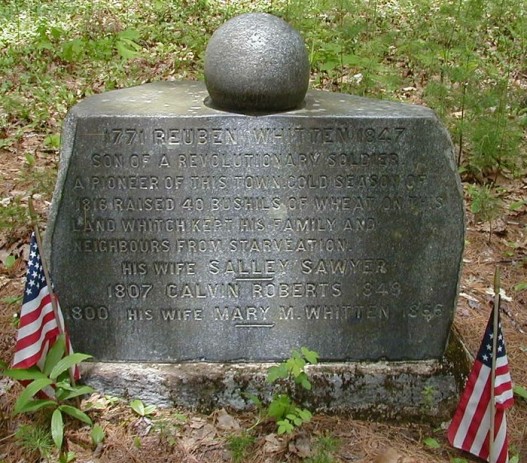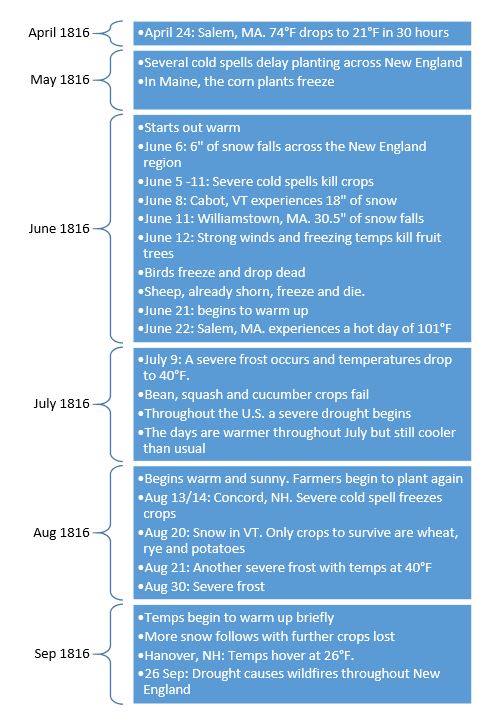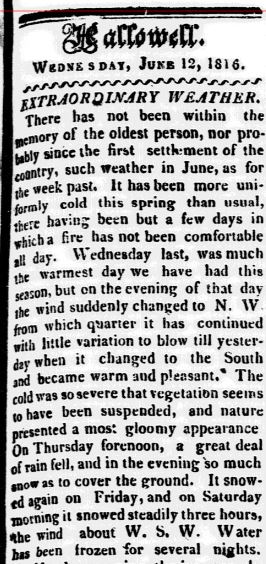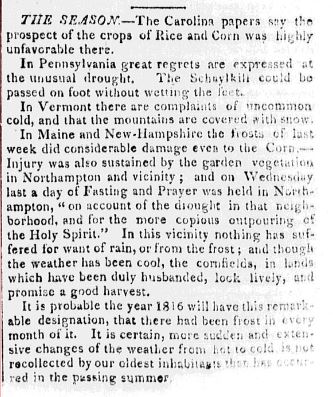When we look at the factors that caused our ancestors to migrate from one place to another, specifically within the United States, do we consider the effect that climate disasters may have had? Most of us are familiar with the Dust Bowl, which forced thousands of families in Texas, Oklahoma and Kansas, to abandon their farms, devastated by crop losses and unable to pay their mortgages and migrate westwards towards California.
For hundreds of years America was largely an agricultural society, dependent on the weather for providing good conditions for crop growth. Many of our farming ancestors lived or died by the harvest their lands produced. Climate disasters, and their accompanying economic losses, were catastrophic to families, and to communities.
In 1847, a 76-year old farmer by the name of Reuben Whitten died in Holderness, Grafton County, New Hampshire.1 Back in the summer of 1816, Reuben had harvested a good wheat crop which he had shared with his family and neighbors. Why was that act important? By sharing his wheat crop, Reuben saved his family and neighbors from starving at a time when all their crops had failed, and many of their sheep had frozen to death, in the summer. In fact, Reuben’s neighbors were so thankful to him, that family members later erected a stone commemorating his selfless act.
 “1771 Ruben Whitten 1847
“1771 Ruben Whitten 1847
Son of a Revolutionary Soldier
A Pioneer of this Town. Cold season of
1816 Raised 40 Bushils of Wheat on this
Land whitch Kept his Family and
Neighbours from Starveation.”
How was it that crops failed and animals froze in what should have been the warm and sunny summer of 1816 in New England? What was the ‘cold season of 1816’ to which the words carved onto the headstone referred? Known also as the “year without a summer” or “eighteen hundred and froze to death”, 1816 was a year that few who lived in the New England region would soon forget.
No-one could have expected that the mild start to April 1816 would foreshadow a period of frigid temperatures, severe frosts and heavy snows. Summer would not come that year to New England. In Salem, Massachusetts, April 24 started off with a mild 74°F, dropping to 21°F within 30 hours. By May 1816, several cold spells had delayed planting and farmers began to fear that they would not have crops to sell or food to feed their families. The corn crop in Maine had frozen and strong winds and freezing temperatures from Canada killed the buds on the fruit trees. Warm days would bring hope to the farmers and a hasty planting of their crops, that hope only to be dashed a few days later when severe frosts would again occur. This cyclic change in temperatures would continue through September 1816, eventually bringing serious drought to the area and to much of the United States.

Newspapers across the region carried articles on the strange weather and the devastating crop losses. On 12 June, 1816, the Hallowell Gazette of Maine reported that there had been few days without which a fire was needed to keep warm, and that the “cold was so severe that vegetation seems to have been suspended.” 2

From New Hampshire, the Intelligencer of 6 September 1816, reported on various places hit by the unseasonably frigid weather and the damage to the corn crops. Ending the article with, “It is probable the year 1816 will have this remarkable designation, that there has been a frost in every month of it.” 3

The extreme weather and resultant loss of crops forced farmers to leave the New England region. Many moved to western New York and into the Northwest Territory (covering the present states of Ohio, Illinois, Indiana, Michigan, Wisconsin and northwestern Minnesota). Their migration played a part in speeding up westward expansion in the United States and shaped what became known as the American Heartland. The movement of these farming families into what is now Indiana and Illinois helped found those states. 4
Consider again Reuben Whitten sharing his wheat crop with his neighbors in 1816. It takes on much greater significance when we understand the context surrounding his act. He very likely saved some in his community from starvation.
If your family moved from New England around 1816-1818, it is entirely possible the ‘year without a summer’ may have been the cause. Some 15 000 people left Vermont after the summer of 1816 for places west.
Climate disasters were devastating for our farming ancestors and their communities and may be the very reason they moved, searching for better conditions in which to grow their crops and support their families.
- Find A Grave, database and images (https://www.findagrave.com : accessed 9 October 2018), memorial page for Reuben Whitten (1771-1847), Find A Grave Memorial no. 19525630, citing Reuben Whitten cemetery, Grafton county, New Hampshire; Maintained by B.L. Hughes (contributor). ↩
- “Extraordinary Weather,” Hallowell Gazette, Maine, 12 June 1816, page 3, col. 1; online archives, GenealogyBank (https://www.genealogybank.com : accessed 9 October 2018). ↩
- “The Season,” The Intelligencer, Portsmouth, New Hampshire, 5 September 1816, page 2, col. 3; online archives, GenealogyBank (https://www.genealogybank.com : accessed 9 October 2018). ↩
- Wikipedia (https://en.wikipedia.org), “Year Without a Summer,” rev. 17:18, 27 August 2018. ↩


I have included your blog in INTERESTING BLOGS in FRIDAY FOSSICKING at
https://thatmomentintime-crissouli.blogspot.com/2018/10/friday-fossicking-19th-oct-2018.html
Thank you, Chris
LikeLiked by 2 people
A well-deserved inclusion!
LikeLiked by 2 people
Thanks, Liz!
LikeLike
Thank you, Chris. Much appreciated!
LikeLiked by 1 person
I think I had some New Englanders that went west during that time frame. Time to go back and take a look. Thank you for adding to my knowledge!
LikeLike
I just forwarded this to a farmer friend who I’ve been helping research her family in New Hampshire right at this same time! They would have lived there through the year when summer didn’t come! I wonder if this had to do with some of her family moving to Wisconsin.
Thanks for your article. It couldn’t have come at a more striking time for me!
LikeLiked by 2 people
Jennie, I hope it helps your friend! So many people (especially the farmers) moved from New Hampshire between 1816-1819 seeking better conditions for their families. I wouldn’t be surprised to find that your friend’s family was among those that moved. Thanks for stopping by!
LikeLiked by 1 person
I just forwarded this to a farmer friend who I’ve been helping research her family in New Hampshire right at this same time! They would have lived there through the year when summer didn’t come! I wonder if this had to do with some of her family moving to Wisconsin.
Thanks for your article. It couldn’t have come at a more striking time for me!
Jennie Merkley
LikeLiked by 1 person
I read your post with great interest. My Brown ancestors were farmers in southern New Hampshire during that time. They must have been a hardy lot.
LikeLiked by 1 person
I agree, Liz, they must have been very courageous to face those conditions and keep trying to plant and grow and support their families. I imagine it was an extremely difficult time!
LikeLiked by 1 person
Wow, a really sobering story and part of family history. Your timeline brought it into stark perspective.
LikeLiked by 2 people
As I built the timeline I could see how soul destroying it must have been to keep trying to plant and a few days or weeks later, have the frost and snow return and kill everything off. It really helped me to understand why so many left, seeking better conditions to the west. Thanks for stopping by!
LikeLiked by 1 person
Wow! I loved this post! The things you learn when you start digging into the past. I always wondered why my ancestors moved from New Jersey to Pennsylvania. Maybe this had something to do with it? I’m gonna have to compare my family’s dates and places.
LikeLiked by 2 people
Thanks, Marianne! I hope this helps fill in some info in your family’s story. I always think that no-one really wants to up and move (especially farmers who have invested so much into their land) so they must have been some kind of very strong push factor to get them moving, in this case, the complete failure of crops due to the strange weather!
LikeLiked by 2 people
Enjoyed this post! I love how learning about historical events that took place during the lives of ancestors can give us greater context and understanding of their stories! I believe that this weather pattern was triggered by a volcanic eruption in the East Indies.
LikeLiked by 2 people
Yes, it was a volcano erupting that caused strange weather world wide. It would have been quite scary to experience such strange weather and not know why. I didn’t mention it in the post but there were many articles in the newspapers by preachers calling on all to repent, fearing that the weather was punishment from God. Thanks for stopping by!
LikeLiked by 1 person
Thanks for sharing this story! I never knew about this strange cold summer. It inspired me to look through my family tree to see if any of my family may have been affected by this. I found that my 5th great-grandfather, Alpheus Call, was living in Vermont or Northern New York about 1800-1806, and by 1820 had moved to Ashtabula County, Ohio. Perhaps the cold summer gave him a push to move west? I’ll have to look into this! Thanks for the inspiration!
LikeLiked by 3 people
I think you’ve perhaps found a reason for their move westward! That was one of the popular migrations at the time…from New England to the fertile soil in Ohio. Your family was among those establishing the American Heartland at the time! Thanks for stopping by, EvaAnne!
LikeLiked by 2 people
Stories about the year without a summer always fascinated me. After recent very hot summers here in New England, this is very hard to believe.
I need to look through my family tree to see if this weather prompted some of my family members to move away from New England.
I love the timeline you created!
LikeLiked by 2 people
Thanks, Elizabeth! I love finding historical context supporting migration trails. I had not heard of the year without a summer but in researching it, and creating the timeline, I could see how devastating the weather was, especially for the farmers, and why they would have moved in search of better conditions.
LikeLiked by 1 person
Interesting story. Hard to imagine such extreme weather in summer, isn’t it? My ancestors and their neighbors had to leave their farms and move into town in a year of constant rain and flooding in 1844 in eastern Indiana. No crops could be grown.
LikeLiked by 2 people
It is truly hard to imagine such strange weather! And to imagine the complete devastation for the farmers. Most had little choice in moving, they had to feed their families and to do that, they had to find arable soil. I imagine that for your farming ancestors, constant rain and flooding was equally devastating!
LikeLiked by 2 people